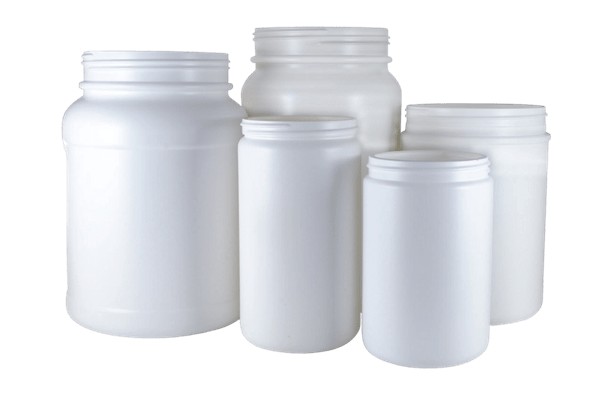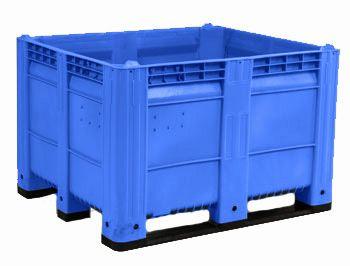The Role of Bulk Plastic Containers in Effective Recycling Practices and Sustainability
Mass plastic containers are integral to modern-day recycling initiatives. Their design enhances the effectiveness of product collection and transport, adding to sustainability objectives. These containers not just maximize area yet likewise help in keeping an eye on contamination degrees. Their implementation is not without challenges. Comprehending the full extent of their influence reveals an intricate relationship between logistics and environmental duty that calls for additional expedition.
Comprehending Mass Plastic Containers
Mass plastic containers work as a necessary component in numerous markets, facilitating the storage and transportation of items. These containers are usually made from durable materials such as high-density polyethylene (HDPE) or polypropylene, which offer resilience and resistance to ecological factors. Their design usually includes attributes like stackability and modularity, enabling effective use of area during both storage space and transit.
Industries such as agriculture, food processing, and producing regularly make use of bulk plastic containers as a result of their lightweight nature and simplicity of handling. The containers are available in different sizes and configurations, catering to the details needs of different items. Their versatility prolongs past plain capability; they can also be customized with lids, handles, and labeling options to boost functionality - bulk plastic containers for sale. As an outcome, bulk plastic containers play a vital duty in maximizing logistics and supply chain operations across numerous industries, consequently adding to overall effectiveness and cost-effectiveness
Advantages of Utilizing Bulk Plastic Containers in Recycling
When companies focus on reusing initiatives, the utilization of mass plastic containers substantially improves the performance of the procedure. These containers are created to maximize room, enabling for the storage space and transportation of bigger quantities of recyclable products. This results in fewer trips to reusing facilities, therefore lowering gas consumption and connected discharges.
Additionally, mass plastic containers are immune and long lasting to different environmental factors, making sure that materials continue to be shielded during handling and transit. Their light-weight layout better adds to decrease transport costs.
The uniformity of these containers helps with far better sorting and processing of recyclable products, which can boost total recycling prices. Organizations that adopt bulk plastic containers also demonstrate a dedication to sustainability, positively influencing their brand name photo. Ultimately, these benefits not only improve reusing techniques but additionally contribute to broader environmental goals
How Bulk Plastic Containers Facilitate Product Collection
Effective material collection is considerably enhanced by the use bulk plastic containers, as they provide a efficient and structured service for gathering recyclable products. These containers are designed to fit huge volumes of materials, which simplifies the sorting and storage space process. Their stackable style optimizes room application, making it easier for centers to organize recyclables without clutter.
In enhancement, mass plastic containers are weather-resistant and resilient, enabling for exterior placement without deterioration. This resilience assures that products stay safeguarded up until they are collected for processing.

The harmony in shapes and size of these containers assists in standardization across collection factors, enabling better monitoring of recyclable quantities. Their clear nature permits for very easy presence of materials, aiding in the tracking of contamination levels and ensuring that just ideal products are gathered. In general, bulk plastic containers play a crucial function in simplifying the material collection procedure, thereby promoting efficient reusing techniques.
Transportation Efficiency and Environmental Impact
Transportation effectiveness plays a crucial function in the recycling procedure, especially via the optimization of load ability wholesale plastic containers. By taking full advantage of the volume of material transported, business can substantially reduce the variety of trips required, thereby minimizing their carbon impact. This strategy not only improves operational effectiveness yet additionally adds to much more lasting environmental techniques.

Enhancing Load Ability
Although enhancing load ability is usually overlooked, it plays a crucial duty in improving transportation effectiveness and reducing ecological influence in reusing methods. By making the most of the volume that mass plastic containers can hold, recycling operations can minimize the number of journeys required for transportation. This not just decreases fuel intake however also reduces the damage on lorries. Efficient load monitoring allows centers to make use of room successfully, making sure that each transportation cycle is as efficient as possible. Additionally, well-optimized tons can cause better arrangements with logistics providers, potentially reducing general prices. Ultimately, boosting load ability adds to a much more lasting reusing system by fostering efficient source usage and hop over to these guys reducing waste produced throughout transport.
Lowering Carbon Footprint
As reusing operations undertaking more info here to decrease their environmental impact, lowering the carbon impact related to transport arises as an essential goal. Mass plastic containers play a critical duty in achieving this objective by boosting load efficiency and optimizing logistics. Their lightweight yet durable style permits optimum freight area usage, lowering the number of trips called for to carry products. By settling shipments, recycling facilities can lower fuel usage and greenhouse gas emissions. Furthermore, purposefully locating recycling centers lessens transportation ranges, additionally reducing carbon results. Furthermore, using fuel-efficient cars and alternate energy sources enhances overall sustainability. By incorporating these techniques, the reusing industry can appreciably decrease its carbon impact, contributing to an extra lasting future.
Obstacles in using Bulk Plastic Containers

Contamination Concerns
Contamination problems stand for a significant obstacle in the reliable use bulk plastic containers within reusing methods. These containers often accumulate residues from previous contents, causing combined products that can prevent the reusing procedure. Pollutants such as food waste, chemicals, or non-recyclable materials can endanger the integrity of the whole set, resulting in increased disposal expenses and reduced reusing rates. In addition, incorrect cleansing or sorting can exacerbate these concerns, making it hard for recycling facilities to refine materials successfully. The existence of contaminants not only affects the quality of recycled items however additionally undermines the total sustainability efforts aimed at decreasing plastic waste. Dealing with these contamination obstacles is crucial for enhancing the effectiveness of mass plastic container recycling.
Recycling Framework Limitations
Inadequacy in reusing infrastructure presents significant challenges for the reliable monitoring of mass plastic containers. Numerous reusing facilities lack the ability to refine large volumes of these containers efficiently, resulting in raised costs and delays. Moreover, insufficient arranging technologies typically lead to contamination, as bulk containers might be blended with other visit homepage products, making complex the reusing procedure. Restricted transport options also prevent the movement of bulk plastic containers to appropriate recycling centers, leading to boosted landfill waste. In addition, a lack of standard procedures for bulk container recycling develops complication among organizations and consumers, additionally making complex initiatives to advertise sustainability. Attending to these infrastructure restrictions is crucial to improve reusing practices and make the most of the possibility of mass plastic containers in a circular economic situation.
Finest Practices for Implementing Bulk Plastic Containers
They must focus on a calculated technique that enhances efficiency and minimizes contamination dangers when companies take into consideration carrying out bulk plastic containers in their recycling methods. Picking the suitable container size and type is vital to suit the volume of materials being refined. Organizations needs to also develop clear labeling and signs to assist customers on proper disposal approaches, minimizing complication and errors. Routine training sessions for staff can even more strengthen these practices, making certain everybody understands their duties in keeping reusing integrity.
Furthermore, companies ought to apply a regular maintenance routine to examine and clean containers, preventing the accumulation of pollutants. Partnering with regional reusing facilities can likewise improve the collection procedure, ensuring that products are effectively refined. Organizations ought to monitor and evaluate their reusing metrics, utilizing this information to refine techniques over time and advertise constant enhancement in their sustainability initiatives.
The Future of Bulk Plastic Containers in Lasting Practices
As companies progressively focus on sustainability, the role of bulk plastic containers in reusing methods is readied to develop substantially. Advancements in materials scientific research are leading to the growth of biodegradable and recyclable alternatives, enhancing the ecological advantages of bulk plastic containers. In enhancement, the implementation of closed-loop systems will enable simpler collection and repurposing of these containers, minimizing waste and source usage.
Technical innovations, such as clever radar, will make it possible for companies to check the lifecycle of bulk containers, enhancing effectiveness in recycling procedures. As customer demand for sustainable methods expands, organizations will likely embrace mass plastic containers designed for reuse and long-term worth. Partnership in between sectors and governments will promote the establishment of standardized reusing methods, ensuring that mass containers are properly incorporated right into broader sustainability initiatives. On the whole, the future of bulk plastic containers appears appealing, with significant possibility for adding to a round economic climate.
Frequently Asked Questions
How Are Bulk Plastic Containers Made and What Products Are Made use of?
Bulk plastic containers are generally made from high-density polyethylene (HDPE) or polypropylene (PP) These materials are refined via shot molding or strike molding strategies, causing durable, lightweight containers appropriate for different storage space and transport demands.
Can Bulk Plastic Containers Be Recycled Numerous Times Before Recycling?
Yes, bulk plastic containers can be recycled numerous times before recycling. Their sturdiness and design enable for repeated usage in different applications, promoting sustainability and resource efficiency while reducing the need for new containers.

What Qualifications Exist for Mass Plastic Containers in Recycling?
Various accreditations for mass plastic containers include the Recycling Collaboration's certification, the Cradle to Cradle Certified ™ standard, and the Lasting Packaging Coalition's standards, making sure containers fulfill specific ecological and recyclability requirements for efficient recycling.
How Do Mass Plastic Containers Compare to Various Other Recycling Storage Options?
Mass plastic containers supply higher sturdiness and ability compared to various other recycling storage choices, reducing the risk of contamination and facilitating reliable transport. Their style sustains much better organization, improving general efficiency in reusing procedures.
What Is the Lifespan of a Mass Plastic Container in Recycling Processes?
The life-span of a mass plastic container in reusing procedures generally varies from 5 to one decade, relying on use, material quality, and environmental conditions, permitting numerous cycles of usage before eventual disposal or recycling.
When organizations prioritize reusing initiatives, the usage of mass plastic containers greatly boosts the efficiency of the process. Transportation effectiveness plays an important role in the reusing procedure, particularly via the optimization of load capacity in bulk plastic containers. The usage of bulk plastic containers in reusing techniques faces significant difficulties, specifically worrying contamination problems and restrictions within reusing facilities. Contamination issues represent a significant obstacle in the efficient use of mass plastic containers within recycling techniques. When companies think about applying mass plastic containers in their recycling practices, they ought to focus on a strategic method that boosts efficiency and decreases contamination risks.